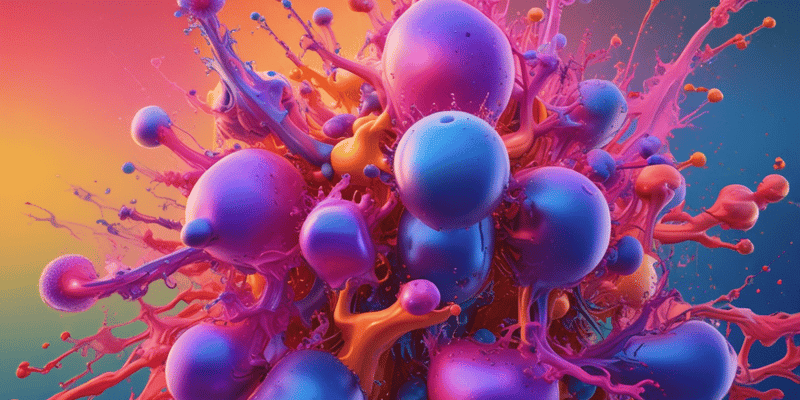Podcast Beta
Questions and Answers
What is the primary product formed during the oxidation of methanol?
Which type of alcohol is oxidized by Sodium Dichromate to yield carboxylic acids under acidic conditions?
What occurs when secondary alcohols undergo oxidation?
What is the role of water in the oxidation mechanism?
Signup and view all the answers
Why are tertiary alcohols generally resistant to oxidation?
Signup and view all the answers
Which reagent can oxidize primary alcohols to aldehydes without further oxidation?
Signup and view all the answers
What compound is produced when phenol is oxidized with sodium dichromate and sulfuric acid?
Signup and view all the answers
What feature of phenol allows it to undergo oxidation despite lacking alpha hydrogens?
Signup and view all the answers
Study Notes
Oxidation of Alcohols
- Methanol Oxidation: Oxidation of methanol forms formaldehyde (aldehyde) and can further oxidize to formic acid (carboxylic acid). Complete oxidation results in CO2.
- Primary Alcohol Behaviour: Primary alcohols oxidize to aldehydes and can further oxidize to carboxylic acids. Under strong oxidation conditions (high temperatures, strong oxidizers), primary alcohols may oxidize completely to CO2.
- Secondary Alcohols: Oxidation of secondary alcohols stops at the ketone level.
- Tertiary Alcohols: Generally resistant to oxidation due to the absence of alpha hydrogens. Typically undergo no reaction unless conditions break carbon-carbon bonds.
- Oxidation Conditions: Primary alcohols often stop at the carboxylic acid level using regular strong oxidizing agents.
Reagents for Oxidation
- Pyridinium Chlorochromate (PCC): A mild oxidizing agent that oxidizes primary alcohols to aldehydes, stopping further oxidation.
- Sodium Dichromate: A strong oxidizing agent that oxidizes primary alcohols to carboxylic acids under acidic conditions. Methanol with this reagent oxidizes to CO2.
- Sodium Hypochlorite: A mild oxidizing agent when combined with weak acids (like acetic acid); oxidizes primary alcohols to aldehydes.
- Swern Oxidation: Employs DMSO, oxalyl chloride, and triethylamine; converts primary alcohols to aldehydes.
- Potassium Permanganate: A strong oxidizing agent that oxidizes primary alcohols to carboxylic acids under acidic conditions.
Mechanism of Oxidation
- Oxidation Reaction: Involves converting a weak acid to an active electrophilic form using hypochlorous acid (HOCl) and removing an alpha proton instead of a beta proton, forming a double bond leading to aldehyde or ketone formation.
- Good Leaving Group: Water acts as a leaving group during oxidation, facilitating the elimination step in the reaction.
- Alpha vs. Beta Protons: Oxidation reactions focus on eliminating alpha protons (attached to the carbon of interest), unlike typical E2 reactions targeting beta protons.
Phenol Oxidation
- Phenol Reactivity: Despite lacking alpha hydrogens, phenol can be oxidized due to its aromatic ring structure, leading to the formation of benzyl quinone when reacted with sodium dichromate and sulfuric acid.
- Reduction of Benzyl Quinone: Can be reduced back to hydroquinone, possessing two hydroxyl groups, contrary to phenol's single hydroxyl feature.
Summary of Oxidizing Agents
- Mild Agents: PCC, sodium hypochlorite combined with acetic acid.
- Strong Agents: Sodium dichromate and potassium permanganate under acidic conditions facilitate more complete oxidation of primary alcohols.
Oxidation of Alcohols
- Methanol oxidation yields formaldehyde, which can further oxidize to formic acid; complete oxidation results in carbon dioxide.
- Primary alcohols primarily oxidize to aldehydes and can continue to oxidize to carboxylic acids.
- Under severe oxidation conditions, primary alcohols may fully oxidize to carbon dioxide.
- Secondary alcohols oxidize to ketones; this oxidation halts at the ketone stage.
- Tertiary alcohols resist oxidation, lacking alpha hydrogens, and typically don’t react unless carbon-carbon bonds break.
- Standard strong oxidizing agents usually oxidize primary alcohols to carboxylic acids without complete oxidation.
Reagents for Oxidation
- Pyridinium Chlorochromate (PCC): A mild oxidizing agent that specifically oxidizes primary alcohols to aldehydes, preventing further oxidation.
- Sodium Dichromate: A strong oxidizer that converts primary alcohols to carboxylic acids under acidic conditions; methanol fully oxidizes to carbon dioxide with this reagent.
- Sodium Hypochlorite: A mild oxidizing agent that, when combined with weak acids (e.g., acetic acid), converts primary alcohols to aldehydes.
- Swern Oxidation: Utilizes DMSO, oxalyl chloride, and triethylamine to transform primary alcohols into aldehydes.
- Potassium Permanganate: A strong oxidizing agent that oxidizes primary alcohols to carboxylic acids under acidic conditions.
Mechanism of Oxidation
- The oxidation reaction converts a weak acid into an electrophilic form using hypochlorous acid (HOCl), focusing on the removal of an alpha proton to create a double bond leading to aldehyde or ketone production.
- Water acts as a good leaving group during the oxidation reaction, aiding the elimination step.
- Oxidation mechanisms target alpha protons (attached to the reacting carbon), differentiating from standard E2 reactions that target beta protons.
Phenol Oxidation
- Phenol can undergo oxidation despite lacking alpha hydrogens due to its aromatic structure, forming benzyl quinone when reacted with sodium dichromate and sulfuric acid.
- Benzyl quinone can be reduced back to hydroquinone, which contains two hydroxyl groups, unlike phenol which has only one.
Summary of Oxidizing Agents
- Mild oxidizing agents include PCC and sodium hypochlorite in combination with acetic acid.
- Strong oxidizing agents such as sodium dichromate and potassium permanganate under acidic conditions enable complete oxidation of primary alcohols.
Studying That Suits You
Use AI to generate personalized quizzes and flashcards to suit your learning preferences.
Description
Explore the process of oxidation in alcohols, including methanol, primary, secondary, and tertiary alcohol behavior. Understand the reagents used for oxidation, such as Pyridinium Chlorochromate and Sodium Dichromate, along with the conditions required for each reaction. This quiz will test your knowledge on the transformations that alcohols undergo during oxidation.




